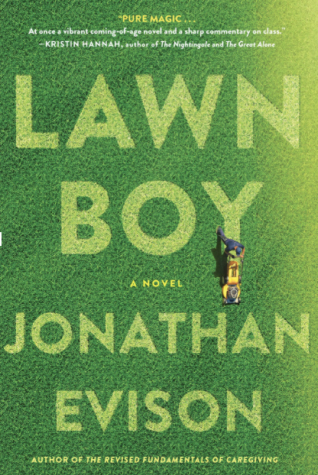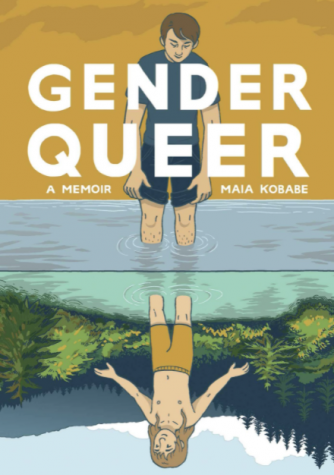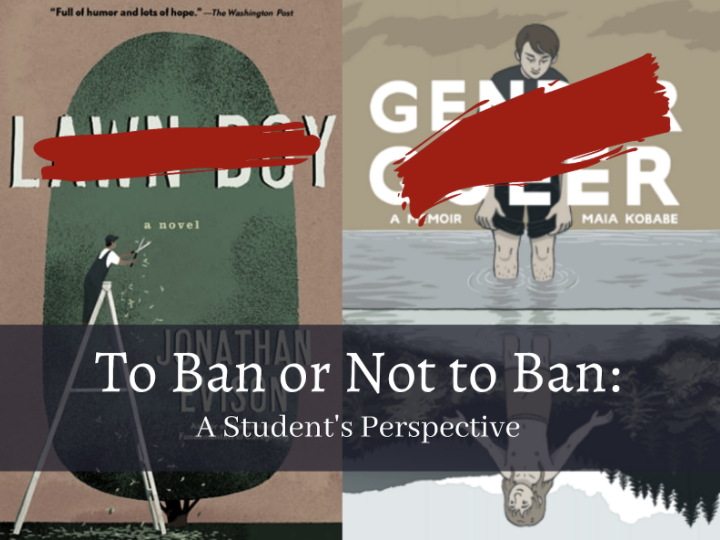Lawn Boy,Gender Queer shouldn’t be banned, they should be celebrated
Lawn Boy and Gender Queer have been criticized for sexual content, but senior Sarah Smack argues they belong in the LFHS library.
December 3, 2021
In the wake of nation-wide debates about the content taught in schools, books have taken the brunt of the criticism. What started as a complaint in Fairfax County, Virginia over two books in the school library, Lawn Boy by Jonathan Evison and Gender Queer by Maia Kobabe, sparked a fire of book bans and challenges across the country.
Questions over these books have prompted LFHS to create a book review committee. I decided to take a closer look and see what it was about these books that were catching the attention of the nation.
Lawn Boy by Jonathan Evison
 Jonathan Evison’s semi-autobiographical novel tackles issues about race and class and takes jabs at the double-standard of the American dream.
Jonathan Evison’s semi-autobiographical novel tackles issues about race and class and takes jabs at the double-standard of the American dream.
Evison explores the life of a boy named Michael “Mike” Muñoz and his journey to understand where he fits in society when his life feels somewhat stuck. Mike is a kid with a good heart and a passion for landscaping, but always seems to be stuck behind barriers outside of his control.
In many ways, Muñoz represents a somewhat Holden Caulfield-esque character, as Mike wonders how he can find his place in the world when he’s living paycheck to paycheck. The reader is forced to face the constant pressure and slew of beatdowns that people like Mike face as they get lucky and hope for the best only to be sent back to square one.
The writing seemed a little crass at times, but not in a way that was unexpected or shocking. More so, it felt as though there were no artistic flourishes to try and brighten Michael Muñoz’s reality like a rose-colored filter, it simply was what it was. In fact, it was actually quite refreshing to see such a blunt perspective, and it made the plot and Muñoz’s character more enthralling.
One of the main reasons the book had become controversial was because of a scene narrator Muñoz describes with another classmate when they were kids. Critics have labeled it pedophilic and pornographic.
Although the scene itself is explicit and sexual, it is not nearly as appalling as it was made out to be, and contained neither pornographic or pedophilic content. There were only a few brief references to it throughout the entire book and by comparison, there have been more explicit scenes in required reading literary pieces than in Lawn Boy.
The book is a very heartwarming story about diligence and hard work in the face of adversity and following your dreams even when the world tells you otherwise. The story provides something that every teenager can relate to and is definitely a book I would highly recommend.
Gender Queer by Maia Kobabe
Gender Queer is an award-winning graphic novel memoir that explores author Maia Kobabe’s journey through discovering eir sexuality and gender in a world that is very heteronormative and binary. The book follows Kobabe from childhood to adulthood, taking the reader through the paradoxes and juxtapositions of societal expectations and identity.
Kobabe, a nonbinary author who uses e/em/eir pronouns wrote the book in mind for queer students and expressed that it was important that queer kids have access to “good, accurate, safe information about these topics.”
What is most striking about Kobabe’s writing is how unafraid e was to show the different challenges of navigating the complex matters of human identity. E delves into the little day to day experiences like the gender dysphoria of getting your period and not being able to find clothes that really fit you.
In many ways it evoked a feeling of isolation and confusion for those moments, almost as if everyone else was functioning at a different frequency than Kobabe because everyone else seemingly felt comfortable with their bodies and who society expected them to be.
Many of the complaints surrounding the book are based on sexual explicitness, citing the book as pornographic and containing pedophilia, the same as Lawn Boy.
There is only one panel in the entire book that references pedophilia in a scene with a Greek vase and Plato’s Symposium, and it does not condone pedophilia in any way. Though there are explicit scenes, it wasn’t extremely shocking, and there are similar scenes in other graphic novels, the only difference being that they are heterosexual. There are probably more references to sex in Romeo and Juliet than there are in Gender Queer.
No matter your gender or sexuality, identity is very complex and it changes and evolves with us throughout our entire lives. Kids aren’t really taught anything about identity and are often left to their own devices to navigate who they are in a world that expects you to be cis and straight.
Though Gender Queer is not representative of everyone’s experiences, it allows queer kids to see themselves represented and encourages education and growth in our relationships with ourselves and those around us.
Verdict
Lawn Boy and Gender Queer are both stand out books and can and should have a place in LFHS’ library. Libraries are places where people of all ages can go to find stories, information, and representation, and it’s important that those things aren’t limited because of taboo or controversial subjects.
Quite simply, it feels like the only reason these books are being targeted is because they have LGBTQ+ themes in them. The only reason that many of these scenes seem shocking is when they are sought out and taken out of context, and that would likely not the be the case if the scenes were heterosexual.
One of the joys of libraries is that they have books for everyone and are spaces for learning and free expression. If you don’t like a book you can always return it and check something else out instead. It’s important that the library’s safe space be maintained and not be infringed by the fear of contentious discussion.
Lawn Boy and Gender Queer shouldn’t be banned, they should be celebrated.









Plover • Feb 7, 2022 at 12:41 pm
“Although the scene itself is explicit and sexual, it is not nearly as appalling as it was made out to be, and contained neither pornographic or pedophilic content. ”
Yup, just normal child sex, nothing unusual.
Dana • Sep 21, 2022 at 11:42 am
I wouldn’t even call the scene in Lawn Boy sexually explicit… the language used, perhaps. The language used describing the act might be considered a bit vulgar/crass.
not pornographic and by no uncertain terms was there any pedophilia. That’s just crazy.
David Kingsworthy • Jan 24, 2022 at 12:18 pm
I’m not anywhere near this district but perhaps you don’t mind an observation about these books… namely that they might be acceptable in a high school library, but maybe not in middle or elementary school libraries. I think that’s a legitimate complaint that parents have right now — that books which seem appropriate for certain ages are being placed in schools where they would be clearly inappropriate. I hope your students consider this point as reflecting the nuances that sometimes accompany controversial topics.
Thanks for letting me post, and congrats for an amazing school web page!
smack enthusiast • Dec 6, 2021 at 9:09 am
so true!!!!! i love you so much smack!!!!!
Community member • Dec 6, 2021 at 1:20 am
I hope that LFHS library can find books that help gay and trans kids navigate the rough seas of growing up that don’t have so many references both literary and visual to oral sex. I’m sure the authors mean well but it’s troubling to see hyper sexuality normalized among ten year old boys and struggling children. What’s also troubling is that these books are still in the school library and the administration seems to be ok with this.
MG • Dec 10, 2021 at 11:30 am
What’s interesting to me, however, is that the multitudinous amounts of heterosexual-centered books containing graphic sex scenes in the library have never been a problem for LFHS parents before. I believe your intentions are good, but I’d take a more critical look at why you just now are worried about this.
moderatethis • Dec 19, 2021 at 10:02 am
I love these books.
dragonne1950 • Jan 12, 2022 at 1:04 pm
so your not opposed to having HUSTLER magazines in your local library? is this what i am to glean from your comments?
your french seat partner :) • Dec 3, 2021 at 9:17 pm
Smackkk good writing you’re so talented keep up the excellent work, I’m so proud of u toooo!!!
your french seat partner :) • Dec 3, 2021 at 9:15 pm
Smackkk good writing you’re so talented keep up the excellent work!!!
Heather Song • Dec 3, 2021 at 3:00 pm
I’m proud of you and this article, Sarah. Thank you for what I feel is a very fair analysis of these books and the reason for why they are being challenged.